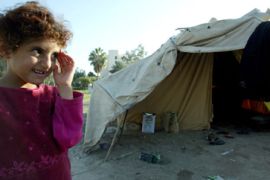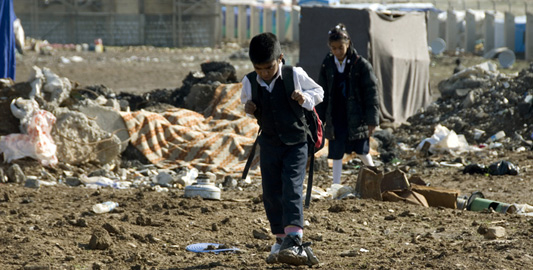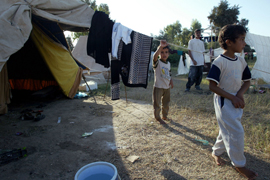Iraq’s displaced living in dumps
International aid worker visits a refugee camp in the north of the country.

 |
| An Iraqi boy makes his way through the mud in the Qawala camp on the outskirts of Sulaimaniya in northern Iraq [GALLO/GETTY] |
The Qawala camp, located on the outskirts of Sulaimaniya, is a bleak and depressing place, home to 3,000 internally displaced people from across Iraq. During the rainy winter months, Qawala, which was built on a landfill, resembles a bog.
| The Iraqi refugee crisis since 2003 |
Stray dogs scavenge through the thick layers of mud that coat everything and the stench of sewage hangs in the cold winter air.
Children play among the many discarded refrigerators that have been dumped on the site, which now houses the fragments of people’s broken lives – a warm winter blanket, a cooking pot, a ration card.
Sulaimaniya, a city in northern Iraq, is home to an estimated 60,000 displaced Iraqis, many of whom have fled to escape sectarian violence and killings further south. The vast majority of the displaced come from Baghdad, Diyala and Mosul.
People who were formerly middle-class now rent houses and garages that have been converted into living spaces.
Those with even less are living in tents in a makeshift camp three kilometres from the centre of the city.
Brother beheaded
Five years after the invasion and occupation of Iraq, an estimated two million Iraqis have fled to neighbouring Syria. It is estimated there are a further 1.5 million Iraqis in Jordan and an estimated 1.9 million Iraqis are displaced inside their own country.
 |
| There are several camps for displaced Iraqis throughout the country [GALLO/GETTY] |
Haidi Abdullah Ali, 31, has been living in Qawala for a year and a half with his wife, their six children and his brother’s four orphans. The children’s father was killed by militia operating in the area.
Ali owned his own home in Mosul, where he worked with livestock, earning $300 a day when business was good. Now, he sits in his tent, hugging himself to stay warm, and shakes his head, explaining how he ended up here.
“My brother was a good man – a family man – and he worked hard to provide for his family. He was killed by militia three years ago,” Ali said.
“They took him and killed him and we never found his body but his head was dumped near the house. He was 28 years old.”
Ali’s sister-in-law saw her husband’s remains and suffered a massive heart attack. She died immediately, a 27-year-old mother; her four children were now orphaned.
“I lost another brother when he was killed in an explosion in Mosul. My father begged me to leave – to take the children and leave Mosul for safety. I have lost so much and it’s so hard to carry on.”
“I wonder sometimes what will happen to my children and my brother’s children if I died. I have a kidney problem and need dialysis but I can’t afford it. I had to sell my livestock, my home and everything to get treatment. I feel pity for myself and the situation I’m in.”
Ali’s wife Khushkay spends her days trying to keep busy, washing the children’s clothes and finding other things to do to break up the day.
“This is no way to live,” she said.
“We have nothing to do all day but sit in this tent and try and keep the children warm. I cook one meal a day in the tent which is usually rice and the children haven’t eaten meat since Eid.”
“In Mosul I would feed them meat, rice, lentils and yoghurt. I wish I could go back to my old life, to my lovely house with a bathroom and to my expensive furniture.”
Husband killed
| When I was in Baghdad, I had a husband and he was able to provide a good life for me and the children. Now I have nothing.” |
In another tent, sits Sahira Nsaif Jasmin, a 38-year-old mother of five from the neighbourhood of Dora in Baghdad. Jasmin arrived in Qawala one month ago with her children, brother and his family. She was widowed when her husband was killed in 2006.
“My husband was a taxi driver and one day he went out to work and never came back,” she said.
“His taxi was ambushed and stolen and he was killed. My brother is helping us stay alive by providing us with food and doing his best to give us what things we need and the people here have been kind to us.
Jasmin longs for the life she left behind in Baghdad where she and her husband owned their own home and the children were able to go to school. She said they had electricity, clean water and a roof over their heads – basic life necessities that are now luxuries for most Iraqis.
In Qawala, there are no scholastic facilities.
“In Baghdad they acted like children – they would go out and play and see their friends – here they have nothing to do all day and every day we have the same routine.”
No return
But Jasmin said she doubts that she will ever return to Baghdad. Her relatives in the capital warn her not to return because looting, burglary and kidnappings are still rampant.
“I have no dreams, I don’t think about the future – what future? It’s very cold here in the winter and I have one gas heater to help the children stay warm – it’s on the entire time and the kerosene is very expensive.
“When I was in Baghdad, I had a husband and he was able to provide a good life for me and the children. Now I have nothing.”
There are no official statistics on the number of widows created by the 2003 war in Iraq and subsequent sectarian violence, but government figures range from two to eight million. The Ministry of Women’s Affairs in 2006 estimated that there were at least 300,000 widows in Baghdad alone.
Before the war, 52 per cent of Iraq’s 25-million population was under the age of 18. As the human devastation and fallout from the war continue, the country’s most vulnerable – its women and children – are left to pick up the pieces.
Shaista Aziz is an aid worker for Save the Children UK, which is working with a network of 31 non-governmental organisations to better understand and meet the needs of vulnerable children in Iraq.
